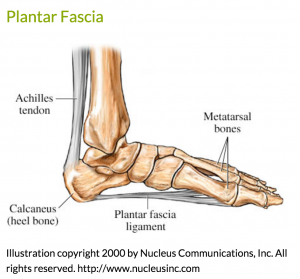How Does Plantar Fasciitis Develop?
The plantar fascia is a ligament attached to the heel bone (calcaneus) that fans out and attaches to the base of the toes (metatarsals)The plantar fascia acts as a bowstring on the bottom of the foot, helping support the arch. A fat pad covers the plantar fascia beneath the heel bone and cushions the heel as it absorbs the force of each footstep.
Plantar fasciitis is an overuse injury that affects the heel and sole of your foot. Plantar fasciitis develops when the plantar fascia is repeatedly stressed and becomes irritated, inflamed or develops small tears. Then your heel will hurt when you stand or take a step to walk. Plantar fasciitis can occur in one or both feet. double ouch!
Stress, inflammation or tearing of the plantar fascia is more likely to occur if:
- You walk, stand, or run for long periods of time, especially on hard surfaces.
- You are overweight.
- You wear shoes that don’t fit well or are worn out.
- You have tight Achilles tendons or calf muscles.
- You have high arches or flat feet.
- You are an excessive pronator (feet roll inward too much when you walk)
Although it’s more common in middle aged people, Plantar Fasciitis can also torment younger people who are on their feet a lot or perform strenuous activities and exercise. Plantar Fasciitis is usually most painful with the first step out of bed in the morning and pain usually intensifies with long periods of standing. Some studies have found a connection between poor ankle range of motion, especially in dorsiflexion which implies that calf tightness plays a role in the development of plantar fasciitis
If you are suffering from Plantar Fasciitis we can help you. We can help you heal faster and more comfortably by fitting you in the proper shoes and/or orthotics and teaching you some effective gentle stretches. The plantar fascia is also forced to absorb significantly more strain when you wear hard, flat shoes or walk around barefoot so avoid that as much as possible. Contact us for an evaluation.

